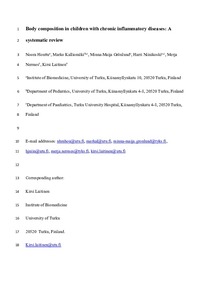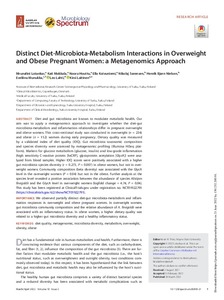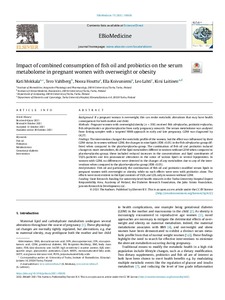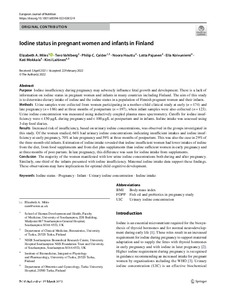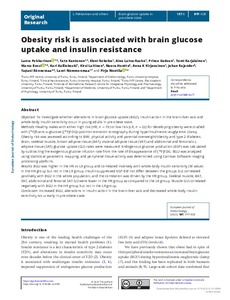Hae
Aineistot 1-10 / 12
The Impacts of Fish Oil and/or Probiotic Intervention on Low-Grade Inflammation, IGFBP-1 and MMP-8 in Pregnancy: A Randomized, Placebo-Controlled, Double-Blind Clinical Trial
Background: We investigated the impact of fish oil and/or probiotics on serum and vaginal inflammatory and metabolic proteins and their relation to the onset of gestational diabetes mellitus (GDM). Methods: Overweight/obese ...
Body composition in children with chronic inflammatory diseases: A systematic review
<p>Background & aims</p><p>Aberrations in body composition are expected in children suffering from chronic inflammatory conditions. The objective is to examine whether children with inflammatory bowel disease (IBD: Crohn's ...
Distinct Diet-Microbiota-Metabolism Interactions in Overweight and Obese Pregnant Women: a Metagenomics Approach
<p>Diet and gut microbiota are known to modulate metabolic health. Our aim was to apply a metagenomics approach to investigate whether the diet-gut microbiota-metabolism and inflammation relationships differ in pregnant overweight and obese women. This cross-sectional study was conducted in overweight (n = 234) and obese (n = 152) women during early pregnancy. Dietary quality was measured by a validated index of diet quality (IDQ). Gut microbiota taxonomic composition and species diversity were assessed by metagenomic profiling (Illumina HiSeq platform). Markers for glucose metabolism (glucose, insulin) and low-grade inflammation (high sensitivity C-reactive protein [hsCRP], glycoprotein acetylation [GlycA]) were analyzed from blood samples. Higher IDQ scores were positively associated with a higher gut microbiota species diversity (r = 0.273, P = 0.007) in obese women, but not in overweight women. Community composition (beta diversity) was associated with the GlycA level in the overweight women (P = 0.04) but not in the obese. Further analysis at the species level revealed a positive association between the abundance of species Alistipes finegoldii and the GlycA level in overweight women (logfold change = 4.74, P = 0.04). This study has been registered at ClinicalTrials.gov under registration no. NCT01922791 (<a href="https://clinicaltrials.gov/ct2/show/NCT01922791">https://clinicaltrials.gov/ct2/show/NCT01922791</a>).<br></p>...
Standing is associated with insulin sensitivity in adults with metabolic syndrome
<p>Abstract</p><p>Objectives<br>To determine how components of accelerometer-measured sedentary behavior (SB) and physical activity (PA), and fitness are associated with insulin sensitivity in adults with metabolic ...
Impact of combined consumption of fish oil and probiotics on the serum metabolome in pregnant women with overweight or obesity
<p><strong>Background: </strong>If a pregnant woman is overweight, this can evoke metabolic alterations that may have health consequences for both mother and child.</p><p><strong>Methods: </strong>Pregnant women with ...
Iodine status in pregnant women and infants in Finland
<p><strong>Purpose: </strong>Iodine insufficiency during pregnancy may adversely influence fetal growth and development. There is a lack of information on iodine status in pregnant women and infants in many countries ...
Relationship between liver fat content and lifestyle factors in adults with metabolic syndrome
The aim of this study was to investigate the associations between liver fat content (LFC), sedentary behaviour (SB), physical activity (PA), fitness, diet, body composition, and cardiometabolic risk factors in adults with ...
Obesity risk is associated with brain glucose uptake and insulin resistance
<p><strong>Objective: </strong>To investigate whether alterations in brain glucose uptake (BGU), insulin action in the brain-liver axis and whole-body insulin sensitivity occur in young adults in pre-obese state.</p><p>< ...
A healthy dietary pattern with a low inflammatory potential reduces the risk of gestational diabetes mellitus
<p><strong>Purpose: </strong>An optimal diet for lowering the risk of gestational diabetes mellitus (GDM) is still to be defined, but may comprise of nutrient intakes, dietary patterns, diet quality, and eating frequency. ...
Effects of reduced sedentary time on cardiometabolic health in adults with metabolic syndrome: A three-month randomized controlled trial
<h3>Objectives</h3><p>To investigate if reducing sedentary behavior improves cardiometabolic biomarkers in adults with <a href="https://www.sciencedirect.com/topics/nursing-and-health-professions/metabolic-syndrome-x" ...

